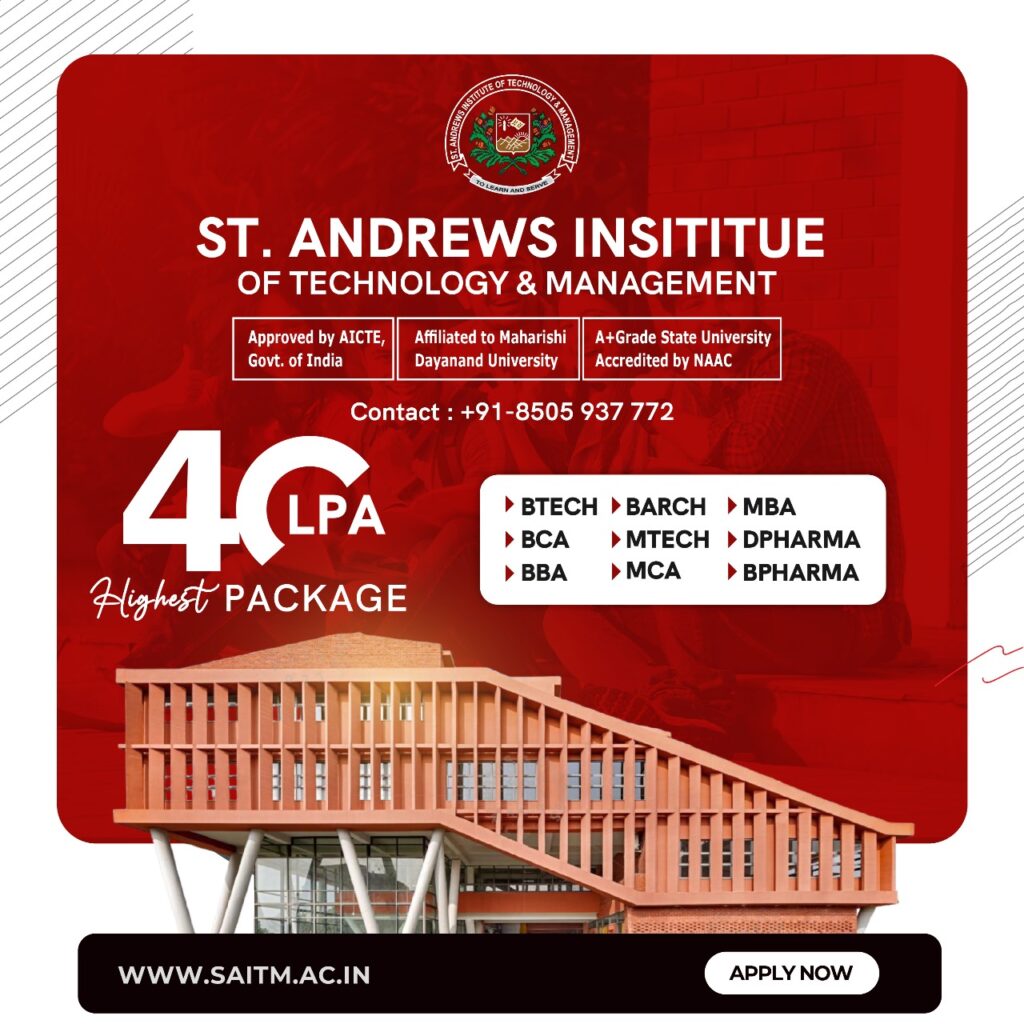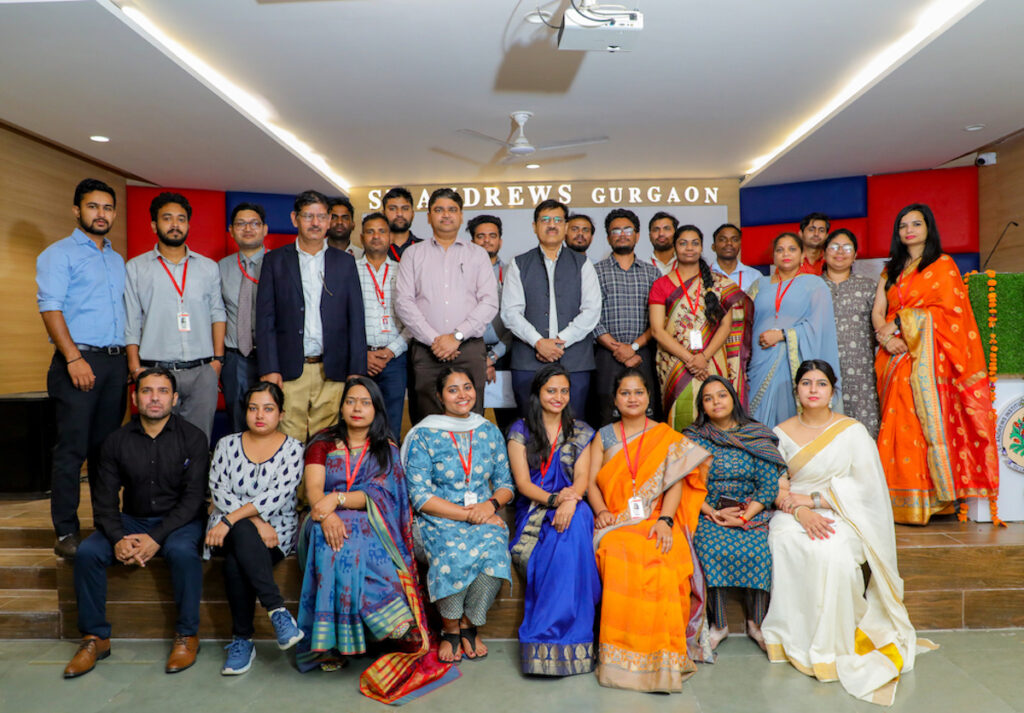MBA marketing
MBA Marketing is a specialized business degree that focuses on strategies for promoting products and services in the marketplace.
It encompasses multiple facets of marketing including market research, consumer behavior, branding, advertising, online marketing, and sales management. Students acquire skills in crafting impactful marketing initiatives, analyzing market dynamics, and devising strategies to engage target demographics.
This specialization readies graduates for positions in marketing management, brand management, product management, market research, advertising, and online marketing across various industries, through MBA courses.
Some of the most opted courses in India and St. Andrews college or different Engineering college or Management colleges are as follows:-
- Btech
- Btech CSE
- Btech ETCE
- MTech
- BCA
- BBA
- MBA
- MCA
- DPharma – St. Andrews College of Pharmacy
- BPharma – St. Andrews College of Pharmacy
- BArch – St. Andrews College of Architecture
Marketing MBA: Curriculum Overview

The curriculum for a Marketing MBA program typically encompasses a wide array of subjects designed to give students a thorough grasp of marketing concepts and tactics.
Marketing Management:
Understanding the fundamentals of marketing, including market segmentation, targeting, positioning, and marketing mix strategies.
Consumer Behaviour:
Exploring the psychological and behavioral aspects that influence consumer decisions and purchasing patterns.
Market Research:
Learning techniques for gathering, analyzing, and interpreting data to identify market trends, consumer preferences, and competitive insights.
Brand Management
Studying strategies for building, managing, and strengthening brand equity through effective branding and positioning strategies.
Advertising and Promotion:
Exploring various advertising channels and promotional techniques to create impactful marketing campaigns and communication strategies.
Digital Marketing
Understanding the role of digital technologies in modern marketing practices, including social media marketing, content marketing, search engine optimization (SEO), and email marketing.
Sales Management:
Developing skills in sales strategy development, sales forecasting, sales force management, and customer relationship management (CRM).
Marketing Analytics
Within an MBA program, students learn to leverage business analytics tools and methodologies to assess marketing performance, evaluate campaign efficacy, and refine marketing strategies through data-driven insights.
Marketing MBA: Eligibility Criteria

The eligibility criteria for Marketing MBA course typically vary depending on the specific requirements of the institution offering the program.
However, here is a detailed overview of the common eligibility criteria:
Educational Qualifications
Candidates must hold a bachelor’s degree from a recognized university or institution.
When considering admission into MBA (Master of Business Administration) courses, candidates are generally accepted from various academic backgrounds, though certain institutions may stipulate specific grade thresholds or percentage criteria.
Most institutions require candidates to have completed their undergraduate degree with a minimum duration of three years.
Minimum Aggregate Score:
Many MBA degree programs, including those in Marketing, necessitate candidates to attain a minimum aggregate score in their bachelor’s degree.
The requisite minimum percentage or CGPA (Cumulative Grade Point Average) may differ depending on the institution when applying for an MBA program.
Candidates are typically required to meet the minimum aggregate score criteria to be eligible for admission consideration into marketing MBA degrees.
Entrance Exams:
In addition to fulfilling the educational qualifications, candidates may need to appear for MBA entrance exams such as CAT, XAT, MAT, CMAT, or others, depending on the institution’s requirements.
These entrance exams assess candidates’ aptitude, analytical skills, language proficiency, and other relevant abilities for admission into an MBA course.
The scores obtained in these entrance exams often play a significant role in the marketing MBA admission process.
Work Experience (Optional):
While not mandatory for all MBA degree programs in Marketing, some institutions may prefer candidates with prior work experience.
Professional experience, particularly in marketing or closely related domains, can bolster a candidate’s profile and have a beneficial impact on their application for a marketing MBA program.
However, work experience requirements, if any, vary among institutions, and some MBA courses may admit fresh graduates without prior work experience.
Other Requirements:
Some MBA course programs may have additional eligibility criteria, such as specific prerequisite courses, language proficiency tests (such as TOEFL or IELTS for international students), or personal interviews.
Prospective candidates are encouraged to review the precise eligibility standards set forth by the institution of their choice for the MBA specializations and verify that they fulfill all prerequisites prior to submitting their application for admission.
Syllabus Overview : Marketing MBA

The syllabus of Marketing MBA in India typically encompasses a comprehensive range of subjects and topics designed to provide students with a strong foundation in marketing principles, strategies, and practices.
While the specific syllabus may vary depending on the institution offering the program, below is an overview of the typical subjects covered in an MBA in Marketing syllabus:
Marketing Management
– Introduction to Marketing Concepts
– Marketing Environment Analysis
– Marketing Planning and Strategy Formulation
– Product and Brand Management
– Pricing Strategies and Policies
– Distribution Channel Management
– Promotion and Advertising Strategies
– Sales Management
Consumer Behavior:
– Understanding Consumer Psychology and Behavior
– Factors Influencing Consumer Buying Decisions
– Consumer Research Methods and Techniques
– Market Segmentation, Targeting, and Positioning
– Brand Loyalty and Brand Switching Behavior
– Consumer Satisfaction and Post-Purchase Behavior
Market Research:
– Introduction to Market Research
– Research Design and Methodology
– Data Collection Techniques (Qualitative and Quantitative)
– Sampling Methods and Sample Size Determination
– Data Analysis and Interpretation
– Market Research Report Writing and Presentation
Marketing Analytics:
– Introduction to Marketing Analytics
– Data-Driven Decision-Making in Marketing
– Marketing Metrics and Key Performance Indicators (KPIs)
– Customer Lifetime Value (CLV) Analysis
– Predictive Modeling and Forecasting Techniques
– Marketing Attribution and Return on Investment (ROI) Measurement
Digital Marketing:
– Overview of Digital Marketing Channels and Platforms
– Search Engine Optimization (SEO) and Search Engine Marketing (SEM)
– Social Media Marketing (SMM) and Content Marketing
– Email Marketing and Mobile Marketing
– Digital Analytics and Measurement Tools
– E-commerce and Online Retailing
International Marketing:
– Global Marketing Environment and Trends
– International Market Entry Strategies
– Adaptation vs. Standardization of Marketing Strategies
– Cross-Cultural Issues in International Marketing
– Export-Import Procedures and Documentation
– International Marketing Research and Intelligence
Strategic Marketing Management:
– Strategic Planning Process in Marketing
– SWOT Analysis and Competitive Positioning
– Marketing Planning Frameworks (e.g., BCG Matrix, Ansoff Matrix), Marketing Budgeting and Resource Allocation, Marketing Performance Evaluation and Control, Marketing Ethics and Social Responsibility
Elective Subjects:
Depending on the MBA program’s structure and the array of courses provided by the institution, students may have the opportunity to select elective courses focused on particular marketing domains. These elective courses provide opportunities for students to gain knowledge in Retail Marketing, Services Marketing, Brand Management, Business Analytics, and other relevant areas.
Subjects Highlights in MBA Marketing

In MBA marketing subjects in India, students undergo comprehensive training in various subjects to equip them with the skills and knowledge necessary to excel in the dynamic field of marketing.
Here’s a detailed overview of the core MBA marketing subjects typically covered:
Marketing Management–
This subject serves as the foundation of marketing MBA programs, covering essential concepts such as market analysis, marketing planning, product development, pricing strategies, distribution channels, and marketing communication. It also focuses on developing key management skills.
Consumer Behavior–
Within an MBA degree program, comprehending consumer behavior is paramount for successful marketing endeavors. This field of study examines the psychological, sociological, and cultural elements that shape consumer preferences and buying behaviors.
Market Research and Analysis:
In an MBA degree program, business analytics holds significant importance for recognizing market potential, comprehending customer requirements, and assessing marketing tactics. This area of study encompasses methodologies for research, techniques for data gathering, analysis of data, and the interpretation of research outcomes.
Brand Management:
Branding is integral to marketing success. Students learn about brand equity, brand positioning, brand identity, brand extension, and strategies for building and managing strong brands.
Sales and Distribution Management:
Within an MBA degree program, this subject concentrates on sales strategies, sales team administration, channel supervision, retail operations, wholesale practices, and logistics oversight, all aimed at facilitating effective product distribution and sales operations.
Advertising and Promotion Management:
Students explore various advertising and promotional strategies, including traditional and digital media advertising, sales promotions, public relations, and integrated marketing communication.
Digital Marketing–
With the rise of digital channels, this subject covers topics such as social media marketing, search engine optimization (SEO), content marketing, email marketing, online advertising, and analytics.
Product Management:
Product management involves overseeing the entire lifecycle of a product, from development to launch and beyond. Students learn about product strategy, development processes, branding, and product lifecycle management.
Marketing Analytics–
In today’s data-driven world, business analytics plays a vital role in decision-making. This subject teaches students how to analyze marketing data, derive actionable insights, and make informed marketing decisions.
Strategic Marketing Management–
This subject focuses on developing marketing strategies aligned with overall business objectives. It covers market segmentation, targeting, positioning, competitive analysis, and strategic planning.
Comparing Marketing MBA Programs: Rankings, Reputation, and ROI

Comparing MBA specializations in Marketing involves assessing several key factors including rankings, reputation, and return on investment (ROI).
Rankings:
Various organizations and publications publish rankings of MBA degree programs globally, regionally, or by specialization. These rankings consider factors such as academic reputation, faculty expertise, research output, student selectivity, and post-graduation outcomes. Prospective students can use these rankings as a starting point to identify top MBA marketing programs.
Reputation:
The reputation of an MBA program is influenced by factors such as historical performance, alumni success, faculty expertise, and industry connections. A program with a strong reputation often attracts high-caliber students, renowned faculty members, and recruiters from leading companies. Prospective students can assess a program’s reputation by researching its track record, alumni testimonials, industry partnerships, and presence in professional networks.
Return on Investment (ROI):
ROI is a crucial consideration for MBA candidates, as it reflects the value gained from the program relative to its cost. Factors influencing ROI include tuition fees, living expenses, opportunity costs (such as forgone salary during the program), and post-graduation salary prospects. Prospective students should analyze employment statistics, salary data, and career advancement opportunities to determine the potential ROI of an MBA marketing program. Additionally, considering factors like scholarships, financial aid, and loan repayment options can further enhance the overall ROI.
When comparing MBA marketing programs based on rankings, reputation, and ROI, prospective students should conduct thorough research and consider the following steps:
Review Rankings:
Explore multiple rankings from reputable sources such as The Financial Times, QS World University Rankings, Bloomberg Businessweek, and U.S. News & World Report. Pay attention to how each ranking evaluates MBA marketing programs and which criteria are most relevant to your preferences and goals.
Assess Reputation:
Research each program’s reputation by examining its history, alumni achievements, faculty profiles, and industry partnerships. Seek insights from current students, alumni, and industry professionals through networking events, online forums, and informational interviews.
Calculate ROI:
Estimate the total cost of attendance for each MBA program, including tuition, fees, living expenses, and opportunity costs. Compare this investment against potential post-graduation outcomes such as salary increases, career advancement opportunities, and networking benefits. Consider the program’s track record in placing graduates in marketing roles and the average salary growth experienced by alumni.
Consider Intangibles:
Beyond rankings, reputation, and ROI, consider intangible factors such as program culture, class size, geographic location, alumni network, and extracurricular opportunities. These factors can significantly impact your overall MBA experience and long-term career satisfaction.
Marketing MBA Admission Process

Admission requirements for an MBA Marketing typically include:
Educational Qualifications:
Applicants are usually required to hold a bachelor’s degree from a recognized university or college for admission into MBA marketing colleges. The degree can be in any discipline, but some programs may prefer candidates with a background in business, marketing, or related fields.
Standardized Test Scores:
Many MBA degree programs require applicants to submit scores from standardized tests such as the CAT and MAT. These tests assess analytical, quantitative, and verbal skills. Some programs may also accept alternative exams or waive the test requirement based on certain criteria.
Work Experience:
While not always mandatory, some MBA degree programs prefer candidates with relevant work experience, particularly in marketing or related fields. The required years of experience can vary depending on the program, but having professional experience demonstrates readiness for advanced study and adds value to classroom discussions.
Letters of Recommendation:
Applicants may need to submit letters of recommendation from supervisors, professors, or other professionals who can attest to their academic abilities, work ethic, leadership potential, and suitability for admission into MBA marketing colleges.
Statement of Purpose or Essays:
Many MBA degree programs require applicants to write a statement of purpose or essays outlining their educational background, career goals, reasons for pursuing an MBA in marketing, and how the program aligns with their objectives. This allows admissions committees to assess applicants’ motivation, communication skills, and fit with the program.
Resume/CV:
Applicants typically need to provide a detailed resume or curriculum vitae (CV) highlighting their academic qualifications, work experience, internships, achievements, and extracurricular activities.
Interview:
Some MBA degree programs may require applicants to participate in an admissions interview as part of the selection process. The interview allows admissions committees to assess applicants’ interpersonal skills, communication abilities, and fit with the program.
MBA Marketing : Top MBA Entrance Exams in India

Here’s a detailed explanation of the top entrance exams for MBA Marketing in India:
CAT (Common Admission Test):
Conducted by the Indian Institutes of Management (IIMs), CAT is the most prestigious MBA entrance exam in India.
It assesses candidates’ quantitative ability, verbal ability, data interpretation, and logical reasoning skills.
Many reputed business schools and IIMs consider CAT scores for admission to their MBA degree programs.
CMAT (Common Management Admission Test):
Conducted by the National Testing Agency (NTA), CMAT is a national-level entrance exam for admission to AICTE-approved MBA degree programs.
It evaluates candidates’ quantitative techniques and data interpretation, logical reasoning, language comprehension, and general awareness.
CMAT scores are accepted by various management institutes across India.
MAT (Management Aptitude Test):
MAT is conducted by the All India Management Association (AIMA) for admission to MBA degree programs in various B-schools across India.
It evaluates candidates’ aptitude in mathematical skills, language comprehension, data analysis, and critical reasoning.
MAT scores are accepted by many management institutes and universities.
IIFT (Indian Institute of Foreign Trade) Entrance Exam:
Conducted by the Indian Institute of Foreign Trade, IIFT entrance exam is specifically for admission to its MBA (International Business) program.
It assesses candidates’ English comprehension, general knowledge, logical reasoning, and quantitative analysis.
IIFT exam scores are considered for admission to its Delhi, Kolkata, and Kakinada campuses.
Top Colleges for MBA Marketing

Here is a list of top colleges for MBA marketing courses:
Indian Institute of Management (IIM), Ahmedabad:
Renowned for its rigorous curriculum and esteemed faculty, IIM Ahmedabad offers a comprehensive MBA in Marketing program with extensive industry exposure and high placement opportunities.
Indian Institute of Management (IIM), Bangalore:
IIM Bangalore’s MBA in Marketing emphasizes practical learning, strategic thinking, and innovative marketing techniques, preparing graduates for leadership roles in the industry.
St. Andrews Institute of Technology and Management (SAITM), Gurgaon
The MBA Marketing program at SAITM, Gurgaon, serves as a foundation for mastering marketing concepts. It covers market analysis, marketing planning, product development, pricing strategies, distribution channels, and marketing communication, while also enhancing essential management skills.
Indian Institute of Management (IIM), Calcutta:
With a focus on experiential learning and real-world applications, IIM Calcutta’s MBA in Marketing program equips students with the skills and knowledge needed to excel in dynamic marketing environments.
Indian School of Business (ISB), Hyderabad:
ISB’s MBA in Marketing program combines cutting-edge research, industry partnerships, and global exposure to develop marketing professionals who can thrive in today’s competitive business landscape.
Xavier School of Management (XLRI), Jamshedpur:
XLRI offers a specialized MBA in Marketing program that fosters creativity, strategic thinking, and analytical skills, preparing graduates to drive growth and innovation in marketing roles.
S.P. Jain Institute of Management and Research (SPJIMR), Mumbai:
SPJIMR’s MBA in Marketing curriculum integrates theoretical concepts with practical applications, enabling students to develop a deep understanding of consumer behavior, market trends, and brand management.
Faculty of Management Studies (FMS), Delhi University, Delhi:
FMS Delhi’s MBA in Marketing program offers a blend of theoretical knowledge and practical skills, enabling students to develop innovative marketing approaches and solutions for today’s business challenges.
MBA Marketing Fee structure in Top colleges

The fee structure for MBA programs, including MBA Marketing, can vary significantly depending on factors such as the reputation of the college, its location, facilities provided, and other amenities.
However, here’s a general overview of the fee structure for MBA programs in some of the top colleges in India:
Indian Institute of Management (IIMs):
The fee for MBA programs at IIMs can range from approximately ₹10 lakhs to ₹25 lakhs for the entire course duration. This fee usually includes tuition fees, hostel accommodation, and other miscellaneous charges.
St. Andrews Institute of Technology & Management (SAITM), Gurgaon
The MBA Marketing program at SAITM, Gurgaon, has fees of approximately ₹2.6 lakhs for the entire course.
Xavier School of Management (XLRI), Jamshedpur
The fee for the two-year MBA program at XLRI can be around ₹20 lakhs to ₹25 lakhs.
Indian School of Business (ISB), Hyderabad
The fee for the one-year Post Graduate Program in Management (PGP) at ISB can be approximately ₹30 lakhs to ₹35 lakhs.
Faculty of Management Studies (FMS), Delhi University:
The fee for the two-year MBA program at FMS can be around ₹1 lakh to ₹2 lakhs for the entire course.
SP Jain Institute of Management and Research (SPJIMR), Mumbai:
The fee for the two-year MBA program at SPJIMR can range from approximately ₹15 lakhs to ₹20 lakhs.
MBA Marketing Average Salary

The average salary for professionals with an MBA in Marketing in India is influenced by various factors, including industry, job role, experience, company size, and geographic location.
Industry:
Different industries offer varying salary levels for MBA marketing graduates. For example, marketing roles in sectors like IT, e-commerce, FMCG, and consulting often come with higher compensation packages compared to other industries.
Job Role:
The specific job role within the marketing domain also impacts salary. Entry-level positions such as marketing executives may offer lower salaries compared to managerial roles like marketing managers or directors.
Experience:
As MBA marketing graduates gain more experience in the field, their earning potential typically increases.
Experienced professionals in marketing jobs with several years of relevant experience tend to command higher salaries than entry-level employees.
Company Size:
The size and scale of the employing organization can influence salary levels. Large multinational corporations and established companies often offer higher salaries and better benefits compared to smaller firms or startups.
Geographic Location:
Salary levels can vary significantly based on the geographic location of the job. Metropolitan cities like Mumbai, Delhi, Bangalore, and Hyderabad generally offer higher salaries to marketing professionals compared to smaller towns or rural areas.
Market Demand:
The demand-supply dynamics in the job market also play a role in determining salaries for MBA marketing students. Industries experiencing high demand for marketing talent may offer more competitive compensation packages to attract and retain skilled professionals.
Skills and Expertise:
Professionals with specialized skills or expertise in areas such as online marketing, brand management, market research, or product marketing may command higher salaries due to their valuable contributions to the organization.
Career Opportunities for MBA in Marketing

An MBA in Marketing opens up a wide array of career opportunities across various industries.
Some common career paths for graduates with this specialization include:
Marketing Manager:
Responsible for developing and implementing marketing plans to promote products or services, manage marketing campaigns, and analyze market trends.
Brand Manager:
Within the curriculum of the best MBA marketing colleges, students oversee the development, positioning, and management of brands to enhance brand equity and drive brand awareness and loyalty.
Product Manager:
At top MBA marketing colleges, students learn to manage the entire lifecycle of a product, from conception to launch and beyond, including market research, product development, pricing, and promotion.
Market Research Analyst:
Conducts research to gather data on market trends, consumer preferences, and competitive landscapes to inform marketing plans and decision-making.
Advertising Manager:
Plans and executes advertising campaigns across various channels, such as print, digital, and broadcast media, to reach target audiences and achieve marketing objectives.
Digital Marketing Specialist:
Focuses on leveraging digital channels and technologies, such as social media, search engine marketing, and email marketing, to drive brand visibility, engagement, and conversion.
Sales Manager:
Leads a sales team, sets sales targets, develops sales strategies, and oversees the implementation of sales plans to achieve revenue goals and business objectives.
Marketing Consultant:
Provides strategic advice and guidance to businesses on marketing issues, such as market entry strategies, brand positioning, product development, and customer acquisition.
Public Relations Manager:
Manages communication and relationships with stakeholders, including customers, media, investors, and the public, to enhance the organization’s reputation and goodwill.
Entrepreneurship:
Some pursuing MBA marketing choose to start their own businesses or pursue entrepreneurial ventures in areas such as online commerce, digital marketing agencies, or niche product/service offerings.
Top Recruiters for Marketing MBA

Image 9 – SAITM Project Exhibition 2023
Some of the top recruiters for MBA in Marketing graduates in India include:
FMCG Companies:
Fast Moving Consumer Goods (FMCG) companies like Hindustan Unilever, Procter & Gamble, Nestle, and PepsiCo often recruit marketing professionals for roles in brand management, sales, and marketing strategy.
IT and Technology Companies:
Technology firms such as Google, Microsoft, Adobe, and Infosys frequently hire marketing specialists to promote their products and services, manage online marketing campaigns, and conduct market research.
E-commerce Platforms:
Leading e-commerce platforms like Amazon, Flipkart, and Snapdeal require marketing talent to drive sales, manage online advertising, and enhance customer engagement through targeted marketing initiatives.
Retail Chains:
Retail giants such as Reliance Retail, Future Group, and Aditya Birla Retail hire marketing professionals to develop marketing plans, conduct promotions, and enhance brand visibility across their stores.
Advertising and Media Agencies:
Advertising agencies like Ogilvy & Mather, JWT, and DDB Mudra Group, as well as media firms like Zee Entertainment and Times Group, offer opportunities for marketing professionals to work on creative campaigns, media planning, and brand positioning.
Banking and Financial Services:
Banks and financial institutions such as HDFC Bank, ICICI Bank, and Axis Bank recruit marketing professionals to drive customer acquisition, manage product launches, and develop marketing campaigns for financial products.
Consulting Firms:
Consulting firms like McKinsey & Company, Boston Consulting Group (BCG), and Bain & Company often seek marketing expertise to advise clients on market entry strategies, brand management, and customer segmentation.
Pharmaceutical Companies:
Pharmaceutical companies such as Pfizer, Cipla, and Sun Pharma hire marketing professionals to promote pharmaceutical products, conduct market research, and develop marketing plans targeting healthcare professionals and consumers.
MBA in Marketing Industry Insights

Industry insights for an MBA in Marketing provide students with a comprehensive understanding of the marketing landscape, emerging trends, and challenges within various industries.
Market Dynamics:
Students gain insights into the dynamics of different markets, including consumer behavior, market segmentation, and competitive analysis. They learn how to identify market opportunities and develop effective marketing plans to capitalize on them.
Digital Marketing Trends:
With the rise of digital technologies, students explore the latest trends and innovations in digital marketing, such as social media marketing, content marketing, and influencer marketing. They learn how to leverage digital channels to reach target audiences and drive engagement.
Brand Management–
Branding is a crucial aspect of marketing, and students learn about brand positioning, brand equity, and brand management strategies. They understand the importance of building strong brands and maintaining consistent brand messaging across various touchpoints.
Marketing Analytics –
Data-driven decision-making is essential in modern marketing, and students learn how to analyze marketing data to gain valuable insights into consumer behavior, campaign performance, and ROI. They explore techniques such as marketing analytics, predictive modeling, and data visualization.
Global Marketing:
In an increasingly interconnected world, students learn about the challenges and opportunities of marketing on a global scale. They study cross-cultural differences, international market entry strategies, and global brand management to effectively navigate diverse markets.
Emerging Technologies:
Students stay updated on emerging technologies that are transforming the marketing landscape, such as artificial intelligence, machine learning, virtual reality, and augmented reality. They explore how these technologies can be leveraged to create innovative marketing campaigns and enhance customer experiences.
Marketing MBA – Specialization Electives

Specialization electives for an MBA in Marketing allow students to tailor their education to their specific career goals and interests within the marketing domain.
Brand Management –
Students delve into the intricacies of brand development, brand positioning, and brand equity. They learn how to create and manage strong brands that resonate with target audiences, differentiate from competitors, and drive customer loyalty.
Digital Marketing –
With the increasing importance of digital channels, students explore topics such as social media marketing, search engine optimization (SEO), content marketing, email marketing, and online advertising. They gain hands-on experience with digital tools and platforms to execute effective digital marketing campaigns.
Market Research and Analytics:
Students learn how to conduct market research to gather insights into consumer behavior, preferences, and trends. They study quantitative and qualitative research methods, data analysis techniques, and statistical tools to make informed marketing decisions and measure campaign effectiveness.
Product and Pricing Strategy:
This elective focuses on product development, pricing strategies, and product lifecycle management. Students learn how to identify market opportunities, develop competitive pricing strategies, and optimize product portfolios to meet customer needs and maximize profitability.
Integrated Marketing Communications (IMC):
Students explore the principles of integrated marketing communications, including advertising, public relations, sales promotion, and direct marketing. They learn how to develop cohesive marketing communication strategies that deliver consistent messages across multiple channels and touchpoints.
Retail Marketing:
This elective covers retail strategy, merchandising, store management, and omnichannel retailing. Students examine consumer shopping behavior, retail trends, and the role of technology in shaping the future of retail. They gain insights into effective retail marketing plans to drive foot traffic, increase sales, and enhance customer experiences.
Modes of Pursuing MBA Programs

Here’s a detailed explanation of the various types of MBA programs:
Full-Time MBA:
This is the traditional format where students enroll in a full-time program and attend classes on campus. It typically lasts for two years and provides a comprehensive learning experience with opportunities for networking, internships, and extracurricular activities.
Part-Time MBA:
Designed for working professionals who want to pursue their MBA while continuing their careers. Classes are often held in the evenings or on weekends to accommodate work schedules. Part-time programs offer flexibility but may take longer to complete compared to full-time programs.
Executive MBA (EMBA):
Tailored for mid-career professionals with significant work experience and managerial responsibilities. EMBA programs are usually part-time and have a condensed format, often completed in 12 to 24 months. They focus on leadership development and practical application of business concepts.
Online MBA:
Delivered entirely online, allowing students to study from anywhere with an internet connection. Online MBA programs offer flexibility and convenience, making them ideal for working professionals or those who cannot attend classes on campus. The curriculum and accreditation are equivalent to on-campus programs.
Dual-Degree MBA:
Combined programs that enable students to earn two degrees simultaneously, such as an MBA paired with a Master’s in another specialized field like healthcare, engineering, or public administration. Dual-degree programs provide interdisciplinary training and expanded career opportunities.
Specialized MBA:
Concentrated programs that focus on specific areas of business, such as Finance, Marketing, Operations, Entrepreneurship, Information Technology, Healthcare Management, etc. Specialized MBAs provide in-depth knowledge and skills tailored to a particular industry or career path.
International MBA:
Geared towards providing a global perspective on business, with opportunities for international study, language training, and exposure to diverse cultures and markets. International MBA programs prepare students for careers in multinational corporations or global organizations.
Joint MBA:
Collaborative programs offered by multiple universities or institutions, allowing students to benefit from the resources and expertise of each partner institution. Joint MBA programs often combine business education with other disciplines such as law, engineering, or public policy.
FAQ’s
What is in MBA in marketing?
An MBA in Marketing typically covers a wide range of topics related to marketing tactics, consumer behavior, market research, branding, advertising, online marketing, product management, sales management, and marketing analytics.
Is an MBA in marketing good?
An MBA in Marketing can be advantageous for individuals interested in pursuing careers in marketing, branding, advertising, or related fields. It provides comprehensive knowledge and skills relevant to the marketing industry and can open up various career opportunities.
Is MBA marketing in demand?
Yes, MBA marketing professionals are in demand as companies across industries seek individuals with expertise in marketing strategies, brand management, market research, and digital marketing to drive business growth and stay competitive in the market.
Does MBA in marketing pay well?
Salaries for MBA marketing professionals vary based on factors such as job role, industry, experience, and location. However, marketing managers, brand managers, and marketing directors often command competitive salaries, especially in sectors like FMCG, retail, technology, and consulting.
How many types of MBA are there?
There are various types of MBA programs, including full-time MBA, part-time MBA, executive MBA (EMBA), online MBA, specialized MBA (such as MBA in Marketing, Finance, Operations, etc.), dual-degree MBA programs, and international MBA programs.
Which MBA is best to study?
The best MBA program depends on individual career goals, interests, and preferences. It’s essential to consider factors such as program reputation, accreditation, curriculum, faculty, specialization options, alumni network, and career services when choosing an MBA program.
Which MBA is most in demand?
MBA specializations that are currently in high demand include Marketing, Finance, Business Analytics, Information Technology Management, Healthcare Management, Operations Management, and Strategy.
Which MBA class is hardest?
The difficulty of MBA classes can vary based on individual strengths, interests, and prior knowledge. However, subjects like Finance, Quantitative Analysis, and Strategy are often considered challenging due to their complex concepts and analytical nature.
Certainly! Here are some frequently asked questions (FAQs) about MBA Marketing:
What is MBA Marketing?
An MBA in Marketing is a graduate-level business degree program that focuses on developing students’ skills and knowledge in areas such as market research, consumer behavior, branding, advertising, digital marketing, product management, and strategic marketing management.
What are the career prospects after completing an MBA in Marketing?
Graduates with an MBA in Marketing can pursue various career paths in marketing, including roles such as brand manager, product manager, marketing manager, market research analyst, digital marketing strategist, advertising manager, and sales manager. The degree opens doors to opportunities in industries such as consumer goods, technology, healthcare, finance, retail, and consulting.
How long does it take to complete an MBA in Marketing?
The duration of an MBA in Marketing program varies depending on the format (full-time, part-time, online) and the institution offering the program. Typically, full-time MBA programs range from 1 to 2 years, while part-time and online programs may take longer to complete due to students’ ability to pace their studies alongside other commitments.
What skills are developed in an MBA Marketing program?
MBA Marketing programs aim to develop a broad range of skills essential for success in marketing roles. These skills include strategic thinking, analytical reasoning, market research and analysis, consumer insights, branding and positioning, communication and presentation skills, digital marketing expertise, project management, and leadership skills.
Is work experience required for admission to an MBA in Marketing program?
While many MBA programs prefer applicants with some professional work experience, especially for full-time programs, some schools may accept candidates directly from undergraduate programs or with limited work experience. However, work experience can enhance the learning experience and enrich classroom discussions by bringing real-world perspectives into the academic environment.
How can an MBA in Marketing help advance my career?
An MBA in Marketing can provide several benefits for career advancement, including expanded job opportunities, increased earning potential, development of specialized marketing skills, access to a strong alumni network, opportunities for leadership roles, and the credibility and prestige associated with an advanced degree.
What is the difference between an MBA in Marketing and a Master’s in Marketing?
An MBA in Marketing is a broader business degree that includes marketing as one of several specializations, whereas a Master’s in Marketing is a more focused program specifically dedicated to marketing-related topics. An MBA typically covers a wider range of business disciplines, such as finance, operations, strategy, and leadership, in addition to marketing courses.
Are there opportunities for networking and industry connections in MBA Marketing programs?
Yes, MBA Marketing programs often provide numerous opportunities for networking and industry connections. These may include guest lectures by marketing professionals, industry panels, networking events, corporate visits, internships, and alumni mentoring programs. Building a strong professional network can be invaluable for career growth and job placement.





